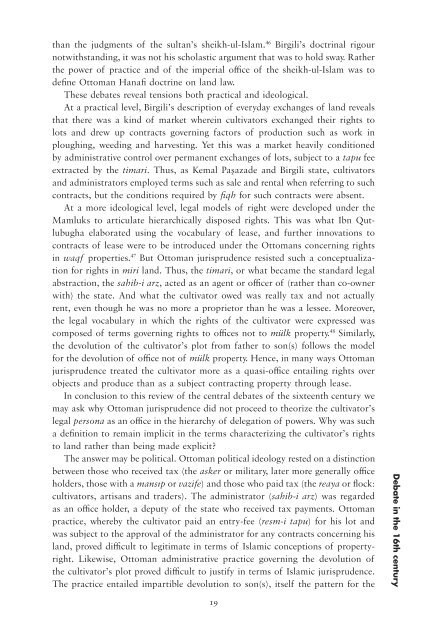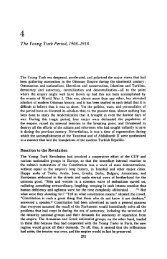Governing property, making the modern state - PSI424
Governing property, making the modern state - PSI424
Governing property, making the modern state - PSI424
Create successful ePaper yourself
Turn your PDF publications into a flip-book with our unique Google optimized e-Paper software.
than <strong>the</strong> judgments of <strong>the</strong> sultan’s sheikh-ul-Islam. 46 Birgili’s doctrinal rigour<br />
notwithstanding, it was not his scholastic argument that was to hold sway. Ra<strong>the</strong>r<br />
<strong>the</strong> power of practice and of <strong>the</strong> imperial office of <strong>the</strong> sheikh-ul-Islam was to<br />
define Ottoman Hanafi doctrine on land law.<br />
These debates reveal tensions both practical and ideological.<br />
At a practical level, Birgili’s description of everyday exchanges of land reveals<br />
that <strong>the</strong>re was a kind of market wherein cultivators exchanged <strong>the</strong>ir rights to<br />
lots and drew up contracts governing factors of production such as work in<br />
ploughing, weeding and harvesting. Yet this was a market heavily conditioned<br />
by administrative control over permanent exchanges of lots, subject to a tapu fee<br />
extracted by <strong>the</strong> timari. Thus, as Kemal Paşazade and Birgili <strong>state</strong>, cultivators<br />
and administrators employed terms such as sale and rental when referring to such<br />
contracts, but <strong>the</strong> conditions required by fiqh for such contracts were absent.<br />
At a more ideological level, legal models of right were developed under <strong>the</strong><br />
Mamluks to articulate hierarchically disposed rights. This was what Ibn Qutlubugha<br />
elaborated using <strong>the</strong> vocabulary of lease, and fur<strong>the</strong>r innovations to<br />
contracts of lease were to be introduced under <strong>the</strong> Ottomans concerning rights<br />
in waqf properties. 47 But Ottoman jurisprudence resisted such a conceptualization<br />
for rights in miri land. Thus, <strong>the</strong> timari, or what became <strong>the</strong> standard legal<br />
abstraction, <strong>the</strong> sahib-i arz, acted as an agent or officer of (ra<strong>the</strong>r than co-owner<br />
with) <strong>the</strong> <strong>state</strong>. And what <strong>the</strong> cultivator owed was really tax and not actually<br />
rent, even though he was no more a proprietor than he was a lessee. Moreover,<br />
<strong>the</strong> legal vocabulary in which <strong>the</strong> rights of <strong>the</strong> cultivator were expressed was<br />
composed of terms governing rights to offices not to mülk <strong>property</strong>. 48 Similarly,<br />
<strong>the</strong> devolution of <strong>the</strong> cultivator’s plot from fa<strong>the</strong>r to son(s) follows <strong>the</strong> model<br />
for <strong>the</strong> devolution of office not of mülk <strong>property</strong>. Hence, in many ways Ottoman<br />
jurisprudence treated <strong>the</strong> cultivator more as a quasi-office entailing rights over<br />
objects and produce than as a subject contracting <strong>property</strong> through lease.<br />
In conclusion to this review of <strong>the</strong> central debates of <strong>the</strong> sixteenth century we<br />
may ask why Ottoman jurisprudence did not proceed to <strong>the</strong>orize <strong>the</strong> cultivator’s<br />
legal persona as an office in <strong>the</strong> hierarchy of delegation of powers. Why was such<br />
a definition to remain implicit in <strong>the</strong> terms characterizing <strong>the</strong> cultivator’s rights<br />
to land ra<strong>the</strong>r than being made explicit?<br />
The answer may be political. Ottoman political ideology rested on a distinction<br />
between those who received tax (<strong>the</strong> asker or military, later more generally office<br />
holders, those with a mansıp or vazife) and those who paid tax (<strong>the</strong> reaya or flock:<br />
cultivators, artisans and traders). The administrator (sahib-i arz) was regarded<br />
as an office holder, a deputy of <strong>the</strong> <strong>state</strong> who received tax payments. Ottoman<br />
practice, whereby <strong>the</strong> cultivator paid an entry-fee (resm-i tapu) for his lot and<br />
was subject to <strong>the</strong> approval of <strong>the</strong> administrator for any contracts concerning his<br />
land, proved difficult to legitimate in terms of Islamic conceptions of <strong>property</strong>right.<br />
Likewise, Ottoman administrative practice governing <strong>the</strong> devolution of<br />
<strong>the</strong> cultivator’s plot proved difficult to justify in terms of Islamic jurisprudence.<br />
The practice entailed impartible devolution to son(s), itself <strong>the</strong> pattern for <strong>the</strong><br />
19<br />
Debate in <strong>the</strong> 16th century












